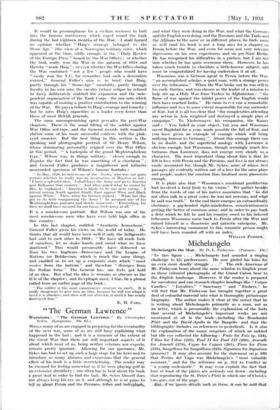" The German Lawrence "
many of us are engaged in preparing for the eventuality of the next war, some of us are still busy explaining what happened in the last ; and it is a measure of the extent of the Great War that there are still important aspects of it about which most of us, being neither veterans nor experts, remain pretty ignorant. Allowing for our ignorance, Mr. Sykes has had to set up such a huge stage for his hero and to introduce so many alarums and excursions that the general effect of his book is a little overwhelming. The reader may be excused for feeling somewhat as if he were playing golf in an extensive shrubbery : one often has to beat about the bush
great deal in order to find the hall. Mr. Sykes himself does not always keep his eye on it, and although he is at pains to tell us. abort Persia and the Persians,- tribes and IndhjAktils _ and what they were doing in the War, and what the Germans rutd the Englishwere doing, and the Russians and the Turks and
the: Afghans-fn the- same' or iri diffeteht plaees,-he finds room
as well (and his book is not a long one) for a chapter Persia before the War, and even for some not very relevant digressions on his own experiences and on pre-Nazi Berlin. He has recognised his difficulties in a preface, but I am not sure whether he has quite overcome them. However, he has taken much trouble to elucidate a little-known subject, add must be congratulated for having undertaken it at all.
. Wassmuss was a German agent in Persia before the War, " an accomplished scholar, a quiet man, with a strange power over the tribesmen." When the War broke out he was still in his early thirties, and was. chosen as the leader of a mission to help stir up a. Holy War from Turkey, to Afghanistan : " the flame of war against the infidel power of the English would then have reached India." He came to e) e :vise a remarkable influence and was to some extent responsible for our surrender at Kut, but it is all too clear that "the complexities attending
any action in Asia weighted and destroyed a simple plan of campaign." To Niedermayer, his companion, the Kaiser said : You failed in your object, but you and Wassmuss saved Baghdad for a year, made possible the fall of Kut, and you have given an example of courage which will bring undying honour to. Germalky."_ About this courage there On be no doubt, and the superficial analogy with Lawrence is obvious enough, but 'Wassmuss, though seemingly much less tortuous than .Lawrence, does not emerge very clearly as4a character. The most important thing about him is that he fell in love with Persia and the Persians, and love is not always easily accounted for, though Mr. Sykes, some of-whose best passages afire evidently written out of a love for the same plaee and people, makes the emotion thus localised seem glamorots enough.
It is plain also that " Wassmuss's emotional predilectiOn had involved a fatal limit to his vision." We gather besides from the words of one of his native associates that " he did not often talk in a great voice; he Was net ner pus, and w14it he said was truth." In the end there emerges an extniordintit+ obstinacy, a pig-headed right-mindedness, conscientiousness getting the better of common sense, and in order to pay bai* a debt which he felt he and his country owed to his beloVed tribesmen Wassmuss tame back to .Persia after.-tile War and ruined himself in a disastrous and quixotic enterprise. Mi. Sykes's interesting monument to this romantic person might well have been rounded off with an index.'
• WILLIAM. PLOBIE14::














































 Previous page
Previous page